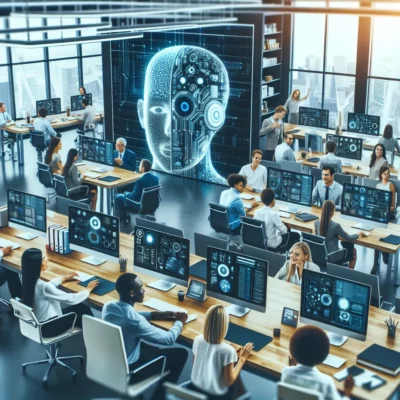Introduction to AI-Powered Solutions
In the rapidly evolving landscape of modern business, Artificial Intelligence (AI) has emerged as a transformative force. This technology, once the stuff of science fiction, is now a practical tool reshaping industries across the globe. AI-powered solutions are not just about futuristic innovations; they are about practical applications that enhance efficiency and cut costs. From healthcare to finance, retail to manufacturing, AI is being integrated into various sectors to streamline operations, optimize resources, and ultimately drive down costs.
Streamlining Operations
One of the most significant advantages of AI is its ability to automate routine tasks, thereby reducing human error and labor costs. In supply chain management, for instance, AI algorithms can predict demand, optimize inventory levels, and even automate the ordering process. This not only minimizes waste but also ensures that resources are allocated efficiently.
Consider logistics, where AI can optimize delivery routes in real time, reducing fuel consumption and improving delivery times. Companies like Amazon and DHL are already leveraging AI to enhance their logistics operations, resulting in substantial cost savings.
Enhancing Customer Service
AI-driven chatbots and virtual assistants are revolutionizing customer service. These tools provide 24/7 support, handle multiple queries simultaneously, and offer personalized responses, all at a fraction of the cost of human-operated call centers. For example, Bank of America’s virtual assistant, Erica, has successfully handled millions of customer interactions, significantly reducing the need for live customer service representatives.
Case studies reveal that businesses implementing AI in customer service have seen a reduction in operational costs by up to 30%. This not only improves the bottom line but also enhances customer satisfaction through faster and more efficient service.
Optimizing Marketing Strategies
AI is a game-changer in marketing, particularly in data analysis and targeted advertising. By analyzing vast amounts of data, AI can identify patterns and trends that humans might miss. This enables businesses to create highly targeted marketing campaigns that reach the right audience at the right time, thereby reducing advertising spend.
Moreover, AI’s ability to personalize customer experiences boosts return on investment (ROI). For instance, Netflix uses AI algorithms to recommend content to users, keeping them engaged and reducing churn. This personalized approach not only enhances user experience but also maximizes revenue.
Reducing IT and Infrastructure Costs
In the realm of IT, AI plays a pivotal role in predicting and preventing system failures. By analyzing system data, AI can identify potential issues before they escalate, minimizing downtime and repair costs. This predictive maintenance is crucial for businesses that rely heavily on IT infrastructure.
Additionally, AI enhances cloud computing and data management efficiencies. By optimizing resource allocation and automating routine tasks, AI reduces the need for extensive IT support, leading to significant cost reductions.
Transforming Human Resources
AI is transforming human resources by streamlining recruitment and talent management processes. AI-powered tools can sift through thousands of resumes in seconds, identifying the best candidates based on predefined criteria. This not only speeds up the hiring process but also reduces recruitment costs.
Furthermore, AI automates payroll and other HR processes, saving time and resources. For instance, AI-driven platforms can manage employee benefits, track attendance, and even handle compliance issues, allowing HR professionals to focus on strategic initiatives rather than administrative tasks.
Real-World Success Stories
Several companies have successfully implemented AI to achieve significant cost savings. For example, General Electric uses AI to optimize its manufacturing processes, resulting in millions of dollars in savings annually. Similarly, Procter & Gamble has integrated AI into its supply chain, reducing inventory costs and improving efficiency.
These success stories highlight the financial impact of AI and offer valuable lessons for other businesses. The key takeaway is that AI is not just a cost-cutting tool; it is a strategic asset that can drive long-term growth and sustainability.
Future Outlook: AI and Cost Efficiency
As AI technology continues to evolve, its role in business cost management is expected to expand. AI will likely become more integrated into decision-making processes, providing insights that drive efficiency and innovation. Businesses that embrace AI now will be better positioned to achieve sustainable financial growth in the future.
The journey towards AI adoption may seem daunting, but the potential benefits far outweigh the challenges. By leveraging AI, businesses can unlock new levels of efficiency, reduce costs, and gain a competitive edge in an increasingly digital world. The future is bright for those willing to embrace this transformative technology.
